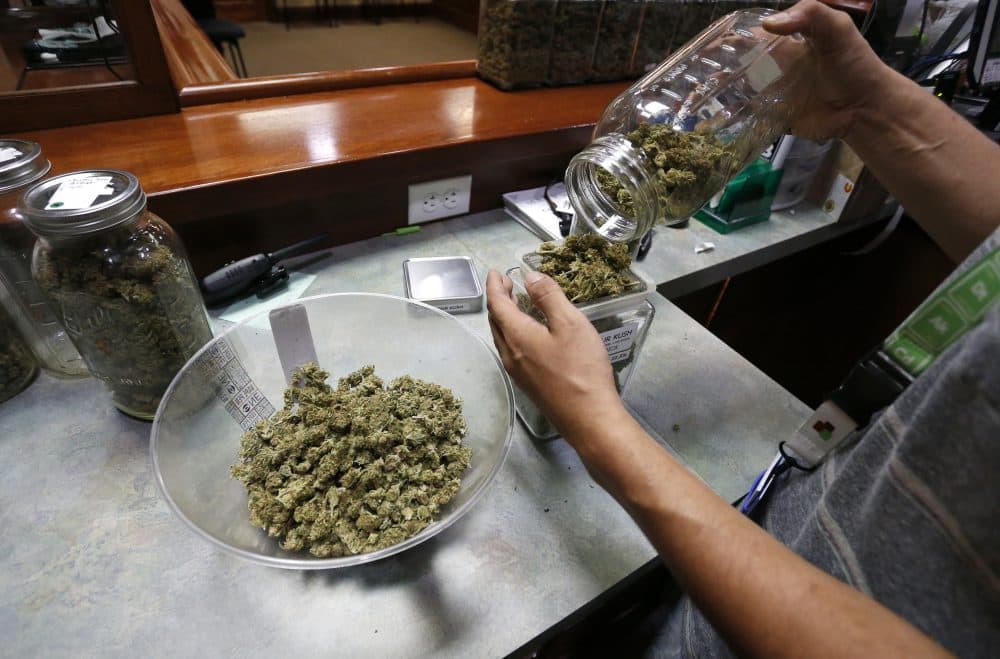Advertisement
Flouting Guidelines, Most Colorado Dispensaries Recommend Cannabis For Pregnancy Nausea, Study Finds

"Hi, I'm eight weeks pregnant and feeling really nauseated," the woman's voice on the dispensary phone line said. "Are there any products that are recommended for morning sickness?"
Researchers put in calls with this query to 400 cannabis dispensaries in Colorado, which voted to legalize marijuana in 2012 and is now closely watched by other states on the same path.
The study turned up some striking results: Nearly 70 percent of the dispensaries recommended some sort of cannabis to cope with morning sickness in early pregnancy.
Those recommendations fly in the face of mainstream medical consensus. The American College of Obstetricians and Gynecologists puts out clear guidelines saying that although the research is far from perfect and much remains unknown, there are enough concerning findings — in animals and children — that they recommend against cannabis use during pregnancy.
"There are concerns for fetal harm, mostly related to fetal growth, as well as some concerns from some more longitudinal studies for adverse brain development when babies are exposed in utero to marijuana," says Dr. Torri Metz, a high-risk obstetrician at Denver Health Medical Center and senior author of the study in this month's journal of Obstetrics and Gynecology.
The concerns extend beyond smoking to other modes of consuming cannabis, she adds, because all of them send the chemical compound THC into the mother's bloodstream, and it crosses into the placenta.
So mainstream medicine says to err on the side of caution. But staffers at the dispensaries in the study said...well...lots of things. Previous studies have found that dispensary staffers tend to base their advice on personal opinions, and some of those opinions quoted in this new paper were:
• "Edibles would not hurt the child. They would be going through the digestional tract."
• "[A]s long as you are not heavily, harshly smoking — like the smoke, I think that is the only way it could physically damage the baby, cause you are inhaling smoke."
• "When I was pregnant and started to feel a little nausea coming on, I did not smoke more than two times a day."
Some of the staffers did note that the packaging of cannabis products in Colorado is required to display warnings of increased risks for pregnant and breastfeeding women. But staffers often recommended cannabis nonetheless, the study found.
Advertisement
Dr. Metz says the findings highlighted "themes of distrust" among dispensary staffers toward mainstream medical guidelines.
"It was disheartening to hear some of the ideas being promoted — that you shouldn't listen to your doctor, and people were not encouraging women to speak with their physicians," she says.
But, Metz adds, the study has prompted widespread discussion in Colorado, and public health staffers are hoping to work with the cannabis industry more to get onto the same page about discouraging pregnant women from using cannabis.
"I think the first step was really just being able to say, 'Hey, look, this is the advice that's being given,' and now there's a real opportunity here for education," she says. "I'm hoping that at least the word gets out to women that we don't recommend marijuana during pregnancy."
A marijuana industry spokesperson told Colorado Public Radio that the industry does tell dispensaries to suggest medical consultations with doctors, and the study tells the industry that dispensary staffs need better training.
So, does Metz any words of wisdom for states -- like Massachusetts — a few years behind Colorado on legalization?
"I would just encourage you all to really engage all stakeholders right from the beginning," Metz says. "So really have everyone from the cannabis industry on board, in conjunction with the scientists and the health care providers, and all of the public health staff, to really provide a consistent message to pregnant women."
For Dr. Jordan Tishler, the new study underscores a point he's been making for several years: "The medical cannabis system simply isn't medical enough."
Tishler runs medical cannabis clinics in Cambridge and Brookline, Massachusetts, called inhaleMD, and is president of the Association of Cannabis Specialists.
"Quite frankly, the problem is that dispensaries don't have the medical backgrounds, nor can they really ever achieve the medical background, that's necessary in order to take care of patients," he says. "And they give erroneous advice."
The reality, he says, is that there are many studies on the subject of cannabis and pregnancy and while none of them are conclusive, some of them are concerning.
"And until we get to the point where we have a firm grasp on the science behind this question," he says, "the best and most responsible [answer] from any clinician is, 'You probably should not be using cannabis while you're pregnant or breastfeeding.' "
More broadly, Tishler says, "In the pharmacy system, we have very specifically designated and legally constrained roles for the various practitioners: You know, if you go to CVS, the cashier cannot give you any medical advice; they need to find you a pharmacist, and the pharmacist can give you a certain level of medical advice, but has a fairly strict limit on what she or he can tell you before saying, 'Go back to your doctor.' "
That system evolved over the last century or so, he says, to make sure that patients are not taken advantage of by a profit-driven system, and get good information.
"We don't have any of those safeguards in the dispensaries, even in the medical dispensaries, and we really need to get to that point," Tishler says.
To follow and discuss marijuana legalization in Massachusetts, join WBUR's Facebook group, Green Rush.
